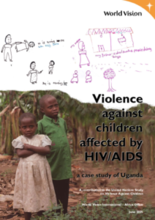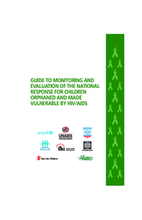Displaying 351 - 360 of 413
Emphasizes the social dimensions of psychosocial support interventions, including participatory groupwork and a focus on reducing stigma and discrimination. Argues that psychological interventions such as counseling should never be a first step.
A guide for governments, international organizations and NGO’s for measuring, monitoring and evaluating the national response for children orphaned and made vulnerable by HIV/AIDS.
Report documenting participatory research conducted on violence against children affected by HIV/AIDS in Uganda. Particular focus on the stigmatisation and discrimination.
The first situational analysis of children orphaned or made vulnerable by HIV/AIDS in Liberia that provides baseline information for developing national planning processes for OVCs.
Guidance on establishing a national monitoring and evaluation process to track a country’s response to children orphaned and made vulnerable by HIV and AIDS. It includes methods and tools for measurement, and recommends a set of core indicators to record national status and changes.
This brief outlines Monitoring and Evaluation sound practices of “spot checking” when costs can be prohibitive and the use of “station days”, a participatory method to collect accurate data on children.
Brief summary of the role of informal, institutional and child-headed households as a result of the AIDS epidemic. Includes general standards by which to implement good practices in child care.
Outlines key findings of survey conducted to investigate the challenges faced by households caring for OVC in South Africa. Conclusion delineates six potential responses to community needs.
Monitoring and Evaluation and Operations Research guidelines for organizations implementing OVC/Children Affected by AIDS programs.
A brief fact sheet on the multilevel support needs of children without parental care. Includes a brief section on statistical data and examples of UNICEF action in several countries around the world.










